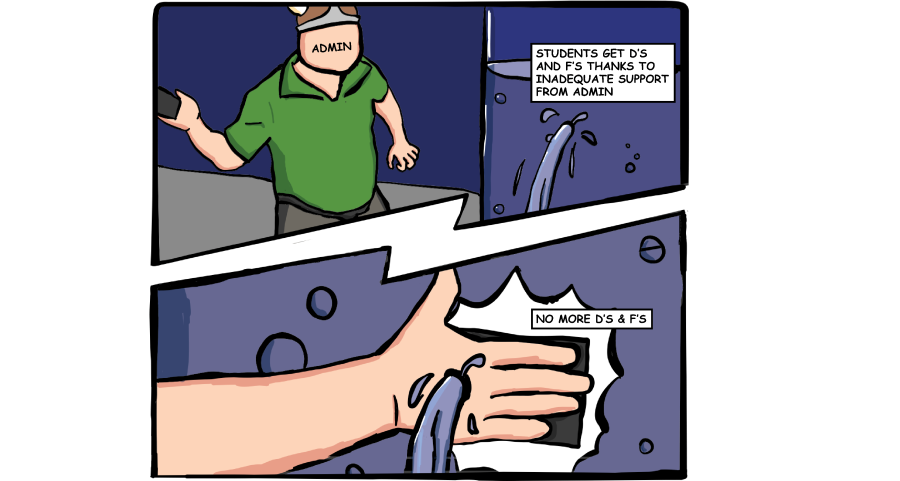In an attempt to solve the disparity in academic performance between white and Asian students and students of color, staff members are discussing the possibility of altering the secondary school grading system.
Among the ideas under consideration are a grading scale that would eliminate D and F grades, replacing them with a “No Mark” which would not affect a student’s grade point average. Another idea being discussed is altering the minimum score on any assignment to 50%, meaning that all work that scores below the threshold, in addition to missing work, would earn a half credit.
While The Campanile thinks there is significant academic inequity within PAUSD, we think policies like these will not solve the problem. They may allow more students to pass classes and receive higher grades, but this does bridge the achievement gap.
Instead, PAUSD should introduce policies such as mandatory extended time on tests, no penalties for late work and mandatory multiple attempts on tests and projects. This approach would better place an emphasis on student learning. More emphasis should also be placed on training teachers to make personal connections with students, including mandatory check-ins and in-person meetings with struggling students.
As part of professional development this year, Principal Brent Kline is having all staff members read parts of Joe Feldman’s book “Grading for Equity,” which analyzes grading data from Centennial College Prep, a school with a majority of students living below the poverty line.
Between three different sixth grade English classes at Centennial, the median grade for one was an A, for another it was a B and for one it was a C. While students in each class had similar standardized test scores and attendance, the classes with the lower grades included subjective scores on items unrelated to learning, such as homework cleanliness. These inconsistent and non-academic grades resulted in inequitable grading, according to the book.
So while we do think PAUSD ought to create a uniform grading framework for all teachers which prioritizes student learning above all else. This priority, though, needs to be balanced with making a grade actually mean something
A larger number of students might pass their classes if a 50% grading floor were implemented, but many students who get a passing grade may not have learned enough of the class content, impairing students’ success in subsequent classes. Eliminating D and F grades is another idea that may seem good on the face of it but likely won’t play out as intended. Last year, due to the uncertainty of the COVID-19 pandemic and online learning, California allowed secondary students to replace A-D grades with “pass” grades.
Yet, many colleges regard a pass as the same as a D. Removing Ds and Fs may have the same effect, devaluing the C grade for students seeking a higher education.
The Campanile praises PAUSD and the Paly staff for having difficult discussions regarding grades and student learning, but we urge the following approach. Instead of a 50% floor for assignments and eliminating D and F grades, a more equitable grading policy would mandate extended time on tests for all students, putting student understanding of class material above an arbitrary time limit. Just because a student completes a test faster does not mean they have learned more.
Making a “No penalties for late work” policy mandatory would allow students to complete schoolwork at their own pace. This would also be beneficial for secondary school students who have extracurricular commitments.
Mandating teachers allow all students multiple attempts on tests and assignments would give everyone a chance to learn from their mistakes, which enhances the education process for everyone.
Finally, emphasizing a teacher’s personal connections with struggling students would improve their interest in the classRather than helping fix the achievement gap, ideas like a 50% floor for assignments and removing Ds and Fs would conceal the disparity in a PAUSD education. However with extra time and multiple retakes on tests and assignments and an emphasis on a personal connection between teachers and students, The Campanile thinks PAUSD can narrow the achievement gap instead of putting a Band-Aid on it.

